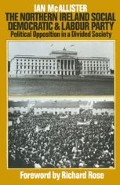Abstract
The transition to organised politics presupposes the existence of many social changes conducive to its initial growth. The individual influence of these social changes may not be large, but collectively they may well have a considerable effect on political activity. Thus the population begins to be socially mobilised through changes in various areas of social life which ‘singly, and even more in their cumulative impact … tend to influence and sometimes to transform political behaviour.’1 The immediate result is a higher level of political awareness, which is increased by improved transportation and communications. This in turn serves to emphasise political and social inequalities. The sense of injustice aroused by inequality translates itself into pressures for political reform which the existing system is likely to find impossible to meet. The eventual outcome is an extension of political participation by all sections of the population and a need for organised groups to structure and exploit this growing mass involvement.
Access this chapter
Tax calculation will be finalised at checkout
Purchases are for personal use only
Preview
Unable to display preview. Download preview PDF.
Notes
Karl W. Deutsch, ‘Social Mobilisation and Political Development’, American Political Science Review, 55:3 (1961) p. 493.
The main themes of this chapter are also examined in Ian McAllister, ‘Political Parties and Social Change in Northern Ireland: the Case of the SDLP’, Social Studies, 5:1 (1976) pp. 75–89.
W. G. Runciman, Relative Deprivation and Social Justice, (Harmondsworth: Penguin, 1966) p. 11.
For succinct collations of evidence, see Campaign for Social Justice, The Plain Truth, (Dungannon: Campaign for Social Justice, 1969).
Ambrose MacAuley, ‘Catholics in the North, 1870–1970’ Newman Review, 2:1 (1970) pp. 21–32.
Frank Gallagher, The Indivisible Island, (London: Gollancz, 1957) ch. 15.
For more objective disseminations of the evidence, see Richard Rose, Governing Without Consensus, (London: Faber, 1971).
Gerard Francis Rutan, ‘Northern Ireland Under Ulster Unionist Home Rule: the Anti-Movement Political System, 1920–63’ (Carolina: unpublished University of North Carolina PhD dissertation, 1964) chs. 5–11.
For an analysis of how Protestants reacted to Catholic allegations of discrimination, see Sarah Nelson, ‘Protestant “Ideology” Considered: the Case of “Discrimination”’ in Ivor Crewe (ed.), British Political Sociology Yearbook, vol. 2 (London: Croom Helm, 1975).
Cited in Claude Mertens, ‘Report on Civil and Social Rights in Northern Ireland’, Human Rights Journal, 2:3 (1969) p. 514.
Cited in Martin Wallace, Northern Ireland: Fifty Years of Self Government, (Newton Abbot: David & Charles, 1971) p. 117.
Denis P. Barritt and Charles F. Carter, The Northern Ireland Problem, (Oxford: Oxford University Press, 1972) p. 96.
Cited in Derek Birrell, ‘Relative Deprivation as a Factor in Conflict in Northern Ireland’, Sociological Review, 20:3 (new series) (1972) pp. 317–43.
Russell Stetler, The Battle of the Bogside, (London: Sheed & Ward, 1970) p. 32.
R. J. Lawrence, The Government of Northern Ireland, (Oxford: Oxford University Press, 1965) p. 122.
F. S. L. Lyons, Ireland Since the Famine, (London: Collins/Fontana, 1973) p. 689.
See Cornelius O’Leary, ‘The Catholic in Politics’, Christus Rex, 17:4 (1963) p. 289 et seq.
P. A. Fahy, ‘Some Political Behaviour Patterns and Attitudes of Roman Catholic Priests in a Rural Part of Northern Ireland’, Economic and Social Review, 3:1 (1971) p. 22.
G. B. Newe, ‘The Catholic in the Northern Ireland Community’, Christus Rex, 18:1 (1964) pp. 26–7.
G. B. Newe, ‘The Catholic in the Northern Ireland Community’, Christus Rex, 18:1 (1964) pp. 26–7. See also Newe’s introduction to John Biggs-Davidson, Catholics and the Union, (Belfast: Unionist Party, 1972).
David Kennedy, ‘Whither Northern Nationalism’, Christus Rex, 13:4 (1959) p. 275.
Daniel Lerner, The Passing of Traditional Society, (New York: Free Press, 1958) p. 43.
For another application of the modernising thesis to Ulster, see Roger Scott, ‘Ulster in Perspective: the Relevance of Non-European Experience’, Australian Outlook, 23:3 (1969) pp. 246–57.
P. A. Compton and F. W. Boal, ‘Aspects of the Inter-Community Population Balance in Northern Ireland’, Economic and Social Review, 1:4 (1970) Table 2.
William Peterson, ‘A General Typology of Migration’, American Sociological Review, 23:3 (1958) p. 263.
Samuel P. Huntington, Political Order in Changing Societies, (New Haven: Yale University Press, 1968) p. 461.
Copyright information
© 1977 Ian McAllister
About this chapter
Cite this chapter
McAllister, I. (1977). Social Mobilisation. In: The Northern Ireland Social Democratic and Labour Party. Palgrave Macmillan, London. https://doi.org/10.1007/978-1-349-03470-3_1
Download citation
DOI: https://doi.org/10.1007/978-1-349-03470-3_1
Publisher Name: Palgrave Macmillan, London
Print ISBN: 978-1-349-03472-7
Online ISBN: 978-1-349-03470-3
eBook Packages: Palgrave Political & Intern. Studies CollectionPolitical Science and International Studies (R0)

